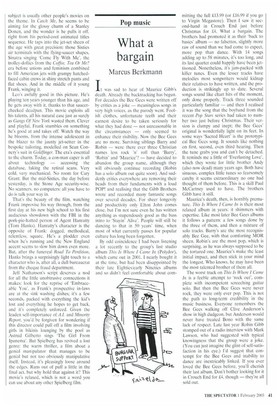What a bargain
Marcus Berkmann
It was sad to hear of Maurice Gibb's death. Already the backtracking has begun. For decades the Bee Gees were written off by critics as a joke — meaningless songs in very high voices, as the parody went. Foolish clothes, unfortunate teeth and their earnest desire to be taken seriously for what they had done — not unreasonable in the circumstances — only seemed to enhance their risibility. Now the Bee Gees are no more. Surviving siblings Barry and Robin — were there ever three Christian names less rock 'n' roll than 'Barry', 'Robin' and 'Maurice'? — have decided to abandon the group name, although they will obviously continue recording (Robin has a solo album out quite soon). And suddenly critics everywhere are removing their heads from their fundaments with a loud POP! and realising that the Gibb Brothers wrote and recorded many fantastic songs over several decades. For sheer longevity and productivity only Elton John comes close. but I'm not sure even he has written anything as stupendously good as the bass intro to `Stayin' Alive'. People will still be dancing to that in 50 years' time, when most of what currently passes for popular culture has long been forgotten.
By odd coincidence I had been listening a lot recently to the group's last studio album This Is Where I Came In (Polydor), which came out in 2001. I nearly bought it at the time, but had been disappointed by their late Eighties/early Nineties albums and so didn't feel comfortable about com
mitting the full £13.99 (or £16.99 if you go to Virgin Megastore), Then I saw it second-hand in Crouch End just before Christmas for £4. What a bargain. The brothers had promoted it as their 'back to basics' album — no falsettos, slightly more raw of sound than we had come to expect, more pop than dance. With 14 songs adding up to 58 minutes, it's too long, and its last quarter could happily have been jettisoned. Nonetheless, it's jam-packed with killer tunes. Even the lesser tracks have melodies most songwriters would kidnap their relatives to have written, and the production is strikingly up to date. Several songs sound like chart hits of the moment, only done properly. Track three sounded particularly familiar — and then I realised it was the song that the boyband from the recent Pop Stars series had taken to number two just before Christmas. Their version is clumpy and inept; the Bee Gees' original is wonderfully light on its feet. In some ways 'Sacred Heart' is the prototypical Bee Gees song. It sounds like nothing on first, second, even third hearing. Then the tune grabs you and can't be detached. It reminds me a little of 'Everlasting Love', which they wrote for little brother Andy (also now dead) many years ago. Both have sinuous, complex little tunes so fearsomely catchy it seems extraordinary no one had thought of them before. This is a skill Paul McCartney used to have. The brothers Gibb have it still.
Maurice's death, then, is horribly premature, This Is Where I Came In is their most relaxed album in years: it shimmers with expertise. Like most later Bee Gees albums it follows a pattern: a few songs done by the three of them, and then a mixture of solo tracks. Barry's are the most recognisably Bee Gee, with that comforting MOR sheen. Robin's are the most pop, which is surprising, as he was always supposed to be the tortured one. Maurice's make the least initial impact, and then stick in your mind the longest. Who knows, he may have been the most talented brother of them all.
The worst track on This Is Where I Came In is a feeble attempt to 'rock out', complete with incompetent screeching guitar solo. But then the Bee Gees were never rock, they were only ever pop. This is not the path to long-term credibility in the music business. Everyone remembers the Bee Gees walking off Clive Anderson's show in high dudgeon, but Anderson would never have treated Bono with the same lack of respect. Late last year Robin Gibb stomped out of a radio interview with Mark Lawson, who had suggested with typical knowingness that the group were a joke. (You can just imagine the glint of self-satisfaction in his eye.) I'd suggest that contempt for the Bee Gees and inability to dance are inextricably linked. If you ever loved the Bee Gees before, you'll cherish their last album. Don't bother looking for it in Crouch End for £4, though — they're all sold out.


























































 Previous page
Previous page